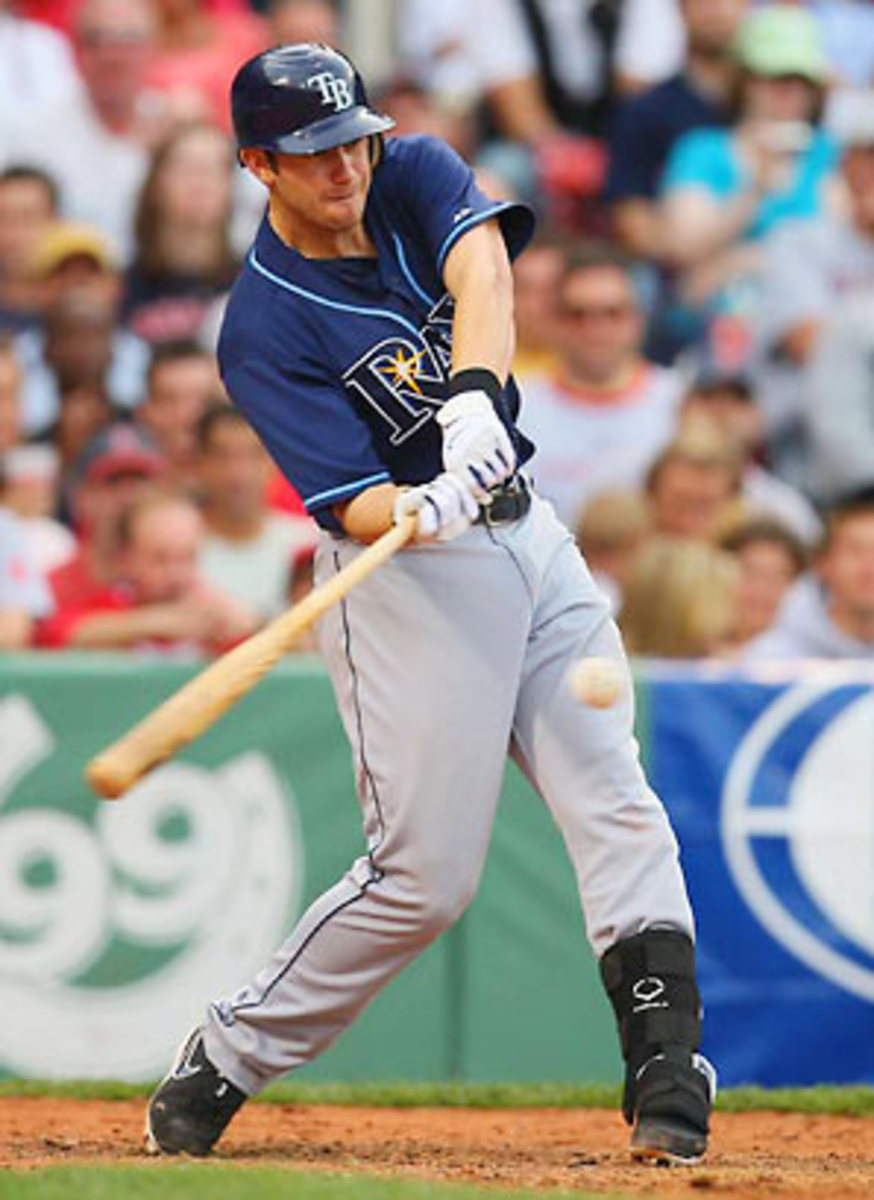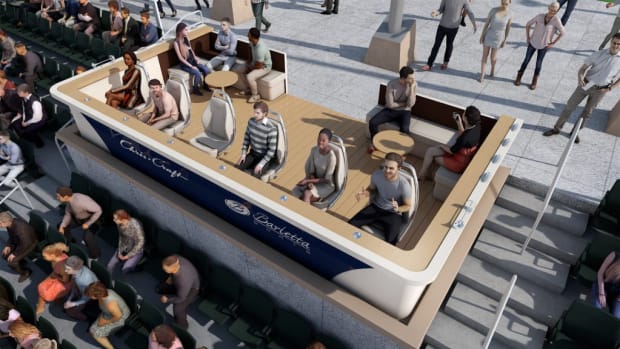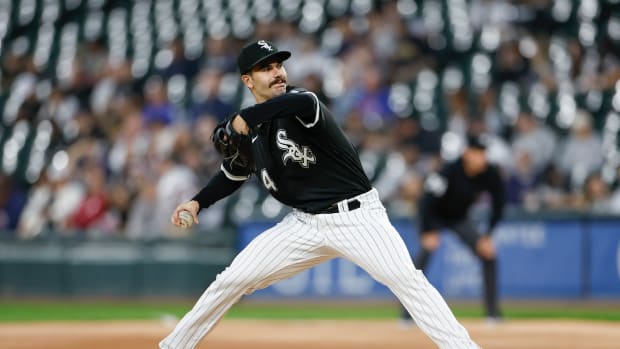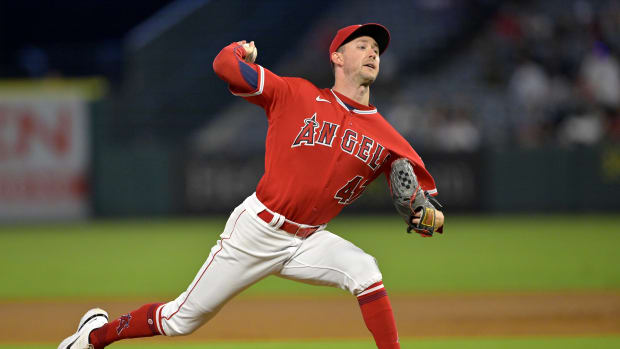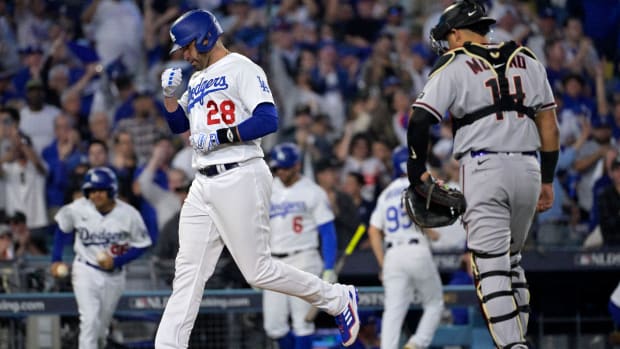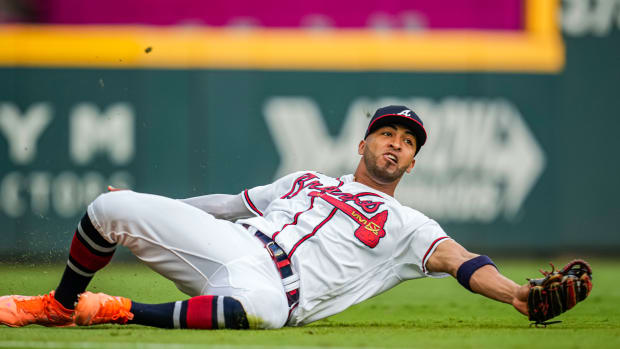Building my dream team, Atlanta's bright future and more
If you were starting a major league franchise today, and Bud Selig offered you any player to choose from, who would you choose?-- Pat, Chicago
These are exactly the kinds of questions that are great fodder for discussion. I would guess that if you asked every general manager in baseball this question, you'd get at least 10 different answers. So with that in mind, and no desire to try and limit it to just one player total, I thought I would try and take a player at every position that I would want to build my team around. The first thing I would do is emphasize youth, since I would want players that'd be around for the long haul. I also would want high-character guys, two qualifications that eliminate Alex Rodriguez and Manny Ramirez right away. Of course, I'm also going to assume that money is no object. What fun would it be if you actually had to try and pay all of these guys?
Catcher: Joe Mauer, Twins, 26He's the reigning Gold Glove winner and, as a two-time batting champion, is the best pure hitter (.321/.403/.469 career through Thursday) at the position in the game. In prior seasons, the only thing he was missing was the ability to hit for power. With eight home runs in his first 19 games since returning from injury, he may have found the final weapon in his arsenal.
First Base: Albert Pujols, Cardinals, 29The oldest player on this team, but also the easiest choice to make. Pujols dealt with a serious elbow injury last year and it made no discernible impact on his performance, as he easily won his second NL MVP award. Of all the remarkable numbers in his career, this might be the most telling: the worst season, statistically, of his career came in 2002, when he batted .314/.394/.561 with 34 home runs and 127 RBIs. His collection of .300/30/100 seasons (eight in a row and counting) has become so routine that it might not seem that he's improving much, but consider this: for the first three years of his career, Pujols had more strikeouts (227) than walks (220). Since then, he's posted a nearly 2:1 BB/K ration and had his best year ever in that category last year, with a career-high 104 walks and only 54 strikeouts.
Second Base: Dustin Pedroia, Red Sox, 25Hands down the most difficult call of all, which is why I went back and forth between Pedroia and Texas' Ian Kinsler about a half-dozen times. (Chase Utley's hip injury was enough to scare me away.) Both debuted in 2006, but Pedroia is a year younger. Their hitting lines are similar (.314/.374/.455 for Pedroia, .291/.360/.483 for Kinsler), though Kinsler has more pop. Perhaps most importantly, Pedroia's a better fielder. The most recent Fielding Bible for last season rated Kinsler's Runs Saved at -11, while Pedroia's was +11, and had Kinsler at a -15 plus/minus while Pedroia's was +15. Any team would be happy to have either of these players, but Pedroia's defense gives him the slight edge over Kinsler.
Shortstop: Hanley Ramirez, Marlins, 25As a 30-30 player, there's no knocking Ramirez's offense, and he's off to another terrific start this year, batting .325 with on-base (.407) and slugging percentages (.563) that would be the best of his career if they hold up. His defense has always gotten loads of criticism, but he has actually shown marked improvement. His fielding percentage has gone from .967 last year (against a .976 league average) to .985 this year (.969 league average) and his total fielding runs above average went from -13.8 in 2007 to 2.6 last year. He might make a better outfielder some day, but for now his offense is so potent that it more than makes up for any defensive deficiencies.
Third Base: Evan Longoria, Rays, 23Another tossup, this time with David Wright of the Mets. Wright's decrease in power is a concern, as he has only three home runs this year after averaging 29 for the past four seasons. Longoria, meanwhile, has 11 home runs and 46 RBIs thus far, proving that his Rookie of the Year performance a season ago was no fluke. Longoria is also a better defensive player (his fielding percentage so far this year is third in the American League, and .025 above the league average).
Left field: Ryan Braun, Brewers, 25Only two players have hit at least 30 home runs in each of their first two major league seasons and Braun is one of them (Pujols is the other). At .326/.451/.574 with eight HRs and 30 RBIs, he's on pace for another outstanding season. His defense at third base was atrocious, but since moving to left last season, he's been better than most expected. He still hasn't committed an error there, and his nine assists last season were better than all but four other left fielders in baseball.
Center field: Grady Sizemore, Indians, 26Carlos Beltran is the better all-around player right now, but at 32, his future is less bright than Sizemore's. A 30-30 player last year, Sizemore has struggled mightily at the onset of this season, batting just .213 with a .298 OBP, but his career averages (.275/.366/.485) suggest that is temporary. He also has more putouts than any other center fielder since 2005 and his .994 fielding percentage is second only to Andruw Jones'.
Right field: Justin Upton, Diamondbacks, 21This former top pick has had scouts drooling since he was a freshman in high school, and, as impossible as it might seem, he's still just 21. His ball-strike recognition and plate discipline still leave much to be desired (121 K's against 54 walks last year and 40 to 16 this year), but that should improve over time. His raw power is immense, and his current batting line (.306/.382/.612) represents substantial increases from last year, his first full season, suggesting a high rate of improvement.
Starting Pitcher: Zack Greinke, Royals, 25Johan Santana (30) and Roy Halladay (32) are a little too old to be building a team around. San Francisco's Tim Lincecum would be a tremendous choice with no qualms, but it's hard to ignore Greinke right now, who could well match Lincecum's Cy Young of a year ago by winning one of his own this year. Greinke's 0.82 ERA in his first nine starts is the best in American League history in the live ball era.
Relief Pitcher: Jonathan Papelbon, Red Sox, 28I'm extremely tempted to go with Mariano Rivera, because at the rate he's going, he might be good enough to pitch another 10 years. Dodgers closer Jonathan Broxton has great stuff (100 mph fastball) and is still only 24, but he's inexperienced enough that I'd want a closer who is good enough and young enough to be able to count on for years to come. Right now, Papelbon is that pitcher. Love or hate his antics on the mound (I lean toward the "hate" side), there's no denying his ability. His saves total has gone up three straight years, and his ERA this year is 0.95, almost a run-and-a-half less than it was a year ago. The only area where he hasn't been stellar is with his command. He's already issued 10 walks this season after yielding only eight all of last season.
You stated in a previous mailbag that you did not think there was a shot of teams having to forfeit games if a player was found to have used steroids on that roster. What about lowering the salary cap for the next season for teams that have players that used steroids? Then those teams would have to pay for not policing their players.-- Rusi Patel, Atlanta
I think you mean luxury tax, since baseball does not have a hard salary cap like other sports do. Again, I think that's unlikely. Teams are not going to be punished for any mistakes their players made in the pre-testing era, and now that there is testing, the 50-game ban of any player who tests positive would seem a sufficient penalty to the team as well as the player. Selig reiterated recently that the testing regimen is working, but if the testing and suspensions were ever to prove ineffective, I'm sure MLB will look at various ways it can be changed to increase the disincentive of using PEDs.
Hey, Ted, how do you think the landscape of the NL East will change once Tim Hudson, Tommy Hanson and Jason Heyward get to the bigs with the Braves and do you think the Braves can recapture the division title from the Phillies?-- Billy H., Suwanee, Georgia
This might be the most interesting division race to watch this year, for the very reasons you mentioned. With the Phillies and Mets, the NL East was going to be worth paying attention to all year anyway (and let's face it, the Nats are always good for some comic relief). But if those teams need to make a push at season's end, they'll likely have to do it via trade, which means sacrificing talent either already on the roster or in the farm system. The Braves, on the other hand, have excellent talent waiting to come up in Hanson and Heyward, and a proven big league ace in Hudson waiting to come off the disabled list. It might not be enough to win the division, but it will certainly make the Braves a better team and a more consistent threat than they have been the past few years.
I have a love/hate relationship with the All-Star balloting. I feel the vast majority of fans do take the voting seriously except when it comes to the zombie-like voting mentality of Yankee/Red Sox nations. Sometimes deservedly (Pedroia), sometimes questionably (Lowell over Longoria??!) and sometimes stupidly (Posada over ANYONE?!?). Is it time that MLB finally acknowledges the lopsided power that the major metro areas hold over the game? I know a salary cap will probably never happen, but what if they limited voting to ONE online ballot or as many as you can get at the ball park.-- Brian Few, Baltimore, Md.
Major league baseball wants as many people to vote as possible because it gives them another chance to tout the health of the game by pointing out how many ballots are cast, and I don't think they really care where those votes come from. As long as there's no repeat of the 1957 controversy, when Cincinnati Reds fans voted seven Reds into the starting lineup, forcing fans to lose the vote for several years, nothing will -- or should -- change. Fans in Boston and New York get a lot of grief, but there's no denying their passion, and they should be able to express that passion at the ballot box as often as they like.
It seems that most of the HOF talk in the Steroid Era is of players whose numbers would normally get them in (Bonds, Clemens, McGwire). What about the players who are borderline? Do they suddenly look more Hall worthy because they put up very good numbers against juiced up players? Mike Mussina is an example of this.-- Joe, Alexandria, Va.
Those players will undoubtedly earn bonus points in the minds of many writers who will reward a clean performance in a dirty era. The problem, of course, will be determining which players were clean and for how long. That's an issue that may never be fully solved, but players like Mussina who have never been tainted by steroids will benefit from that lack of association.






























